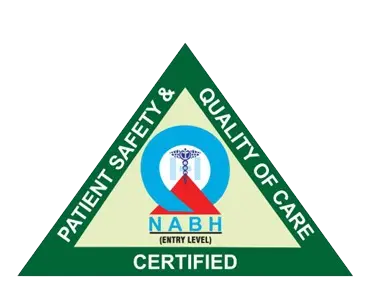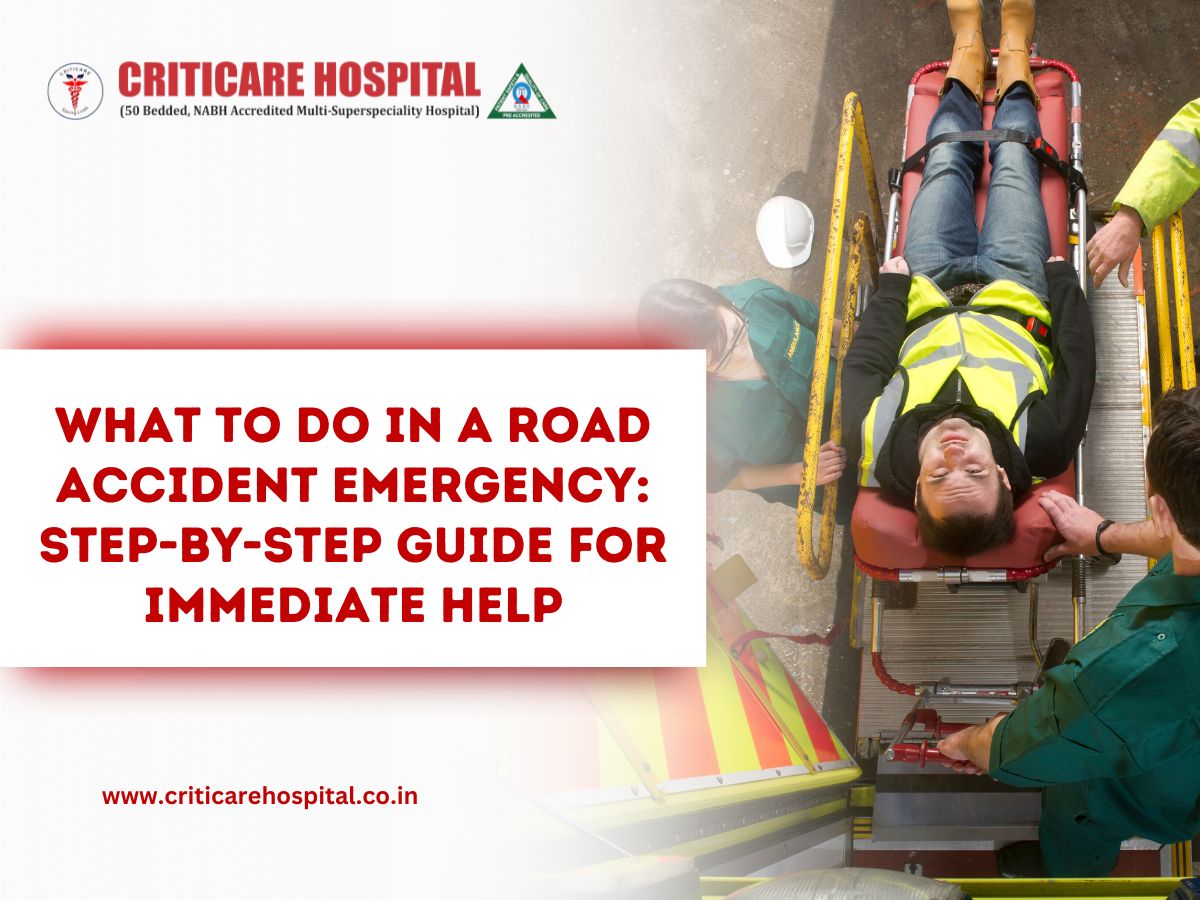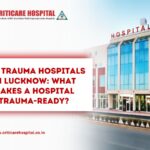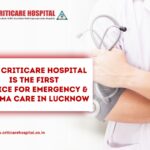Think that you have music turned on and you are returning home in your car after a hard day, and the car is going very slowly, and suddenly you notice the accident far about few meters away. A two-wheeler has crashed into a car, and people are already assembling. You blow a concussion. You are helpless, and yet you want to do something about it, but you just do not know what to do. Sound familiar?
Road mishaps are chaotic, and no one can understand what happens as they take place more often in a country like India than we may like to imply. In these few minutes, human beings find themselves disoriented, scared and commonly paralysed. However, the presence of mind and calmness is exactly when it can save one.
When people visit CritiCare Hospital Lucknow, especially after casualties, one can see that timely assistance is the difference between life and death. This blog is directed toward you, the common man on the street, to understand what can be done during such emergencies, in plain, simple terms, without causing any panic.
Why Your Response Is So Crucial?
Immediately after the occurrence of an accident is a very delicate time. Injuries might appear trivial, but can be severe in nature. He or she can seem and feel okay yet have internal bleeding or trauma. In many cases, the victims are so traumatised or wounded to make a call themselves.
And it is here where you enter. You can fill the divide between injury and recovery through your actions, however minor. However, you need to know a few things before dashing in. All situations are not identical. Assistance can sometimes be made by making a phone call. Sometimes it is simply calming a person down until professionals come.
We will take you step-by-step through it, in a manner easy to follow, and which, in case you happen to be in that situation, you will be able to put to use.
What to do when you are in or witness a road accident
In such situations, when something unexpected has occurred, the initial response is to panic. Now, now, breathe deeply. You want to be there to assist when not add to the confusion.
Begin by looking around. Is it safe? Is there other traffic, glass, spilt petrol or even a fire hazard? When it is dangerous, make sure to maintain a secure distance and contact emergency services early. Suppose that it appears steady enough to proceed; do this with caution.
After reaching near, make sure that those involved are responsive and conscious. You do not need to contact them immediately. Simply ask — “Can you hear?”, “You alright?”, or “How is it hurting?”
They very well might willingly respond, in which case it is positive. Otherwise, it might be grave and medical assistance is needed. Here is what may be done next, calmly and carefully.
What to do at the Scene
- Immediate Call for Help
First and foremost, you have to call in action, not treat. Call 108 (ambulance) or 112 (emergency helpline) or contact Criticare for. Provide the address, the number of the injured persons, and the state of the area (if there is any fire, haemorrhage, loss of consciousness, etc.). Even when you are close to CritiCare Hospital, you can dial the same number in an emergency.
- Secure Visibility and Safety
When you are in your car, activate the hazard lights. At night, use a flashlight on your phone or reflecting objects to signal incoming traffic. This avoids another accident.
- Do not move the injured unless required
Do not attempt to move the person, except in danger (such as around fire). It can be worse to move a person with a spine or head trauma without help.
- Be a Comforter
There is nothing that can be useful than your calm voice. This is to tell them that assistance is at hand. Take their hand when proper. Make them understand that they are not on their own.
- Never Take Off the Helmets, or Give Water
In case the biker is the one injured, then do not remove his helmet. It can be safeguarding their head or spine. Medical professionals should address that as well; do not give them water or any medicine.
- Know How to Control Bleeding
When you have confidence, give light pressure with a clean cloth in case the person is bleeding. If you do not know what to do, however, just wait with them and keep them talking.
- Record Useful Information
Pictures of the scene, vehicle numbers, or damages should be taken, in case possible. These will be useful in the future. In addition, request witnesses to remain or provide their contact information.
Why are these actions important?
You may often think that you are not competent enough to assist; however, you do not require a medical degree to save a life. The severity of most of the road accident cases becomes severe not because of the injury, but due to delays in reaching the hospital or mishandling at the place of the accident.
Accidents such as Internal bleeding, Concussion or brain injury, and Spine and neck injury, and complexities in breathing caused by shock would require attention, but cautiously. Even such trivial procedures as rapidly making the call or keeping the person in one position can diminish complications drastically. Presence of mind comes to your rescue.
What can we do to be more prepared?
It is wonderful to learn the things you need to do in case something like an accident occurs, but it is better to prepare yourself beforehand. You need not wait to have something bad happen in order to be ready.
The following are some of the things you can do:
Keep emergency numbers in your phone: ambulance, local hospital (such as CritiCare – Best Hospital in Lucknow ) and family contacts
Keep some basic first aid in your car. Download such applications as Google Personal Safety or Life360, which can send alerts in case of an accident. Take a short CPR course or first aid course: The NGOs and hospitals where you live frequently offer very short courses that can teach you lifesaving skills in a few hours.
Conclusion
During a road accident, the majority of people would wish that someone would do something. You can be that one. You do not have to be a hero. All you have to be is human.
Hold your breath. Think clearly. Assist as you may. And when you are in doubt, call professionals. People at CritiCare Hospital think that the actual emergency means are awareness and rapid action. We never let you down, we always stand prepared to take action when it counts the most, and we hope, now that you have read this, you do so as well.
When you ever have an emergency, do not hesitate.
Contact the Emergency Helpline of CritiCare: +91 731 0447 949
Since each life is worth it, every second counts.




